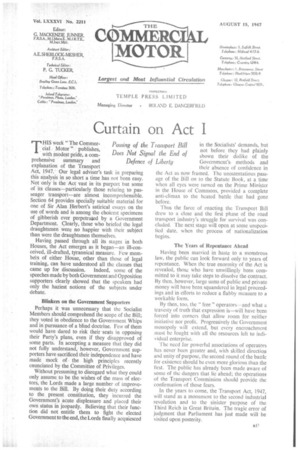Curtain on Act I
Page 23

If you've noticed an error in this article please click here to report it so we can fix it.
THIS week "The Commercial Motor" publishes, with modest pride, a comprehensive summary and explanation of the Transport Act, 1947.Our legal adviser's task in preparing this analysis in so short a time has not been easy. Not only is the Act vast in its purport but some of its clauses—particularly those relating to passenger transport—are almost incomprehensible. Section 64 provides specially suitable material for one of Sir Alan Herbert's satirical essays on the use of words and is among the choicest specimens of gibberish ever perpetrated by a Government Department. Clearly, those who briefed the legal draughtsmen were no happier with their subject than were the draughtsmen themselves.
Having passed through all its stages in both Houses, the Act emerges as it began—an ill-conceived, ill-drafted, tyrannical measure. Few membefts of either House, other than those of legal training, can have understood all the clauses that came up for discussion. Indeed, some of the speeches made by both Government and Opposition supporters clearly showed that the speakers had only the haziest notions of the subjects under debate.
Blinkers on the Government Supporters Perhaps it was unnecessary that the Socialist Members should comprehend the scope of the Bill; they voted in obedience to the Government Whips and in pursuance of a blind doctrine. Few of them would have dared to risk their 'seats in opposing their Party's plans, even if they disapproved of some parts. In accepting a measure that they did not fully understand, however, Government supporters have sacrificed their independence and have made mock of the high principles recently enunciated by the Committee of Privileges.
Without presuming to disregard what they could only assume to be the wishes of the mass of electors, the Lords made a large number of improvements to the Bill. By doing their duty according to the present constitution, they incurred the Government's acute displeasure and placed their own status in jeopardy. Believing that their function did not entitle them to fight the elected Government to the end, the Lords finally acquiesced in the Socialists' demands, but not before they had plainly shown their dislike of the Government's. methods and their absence of confidence in the Act as now framed. The unostentatious passage of the Bill on to the Statute Book, at a time when all eyes were turned on the Prime Minister in the House of Commons, provided a complete anti-climax to the heated battle that had gone before.
Thus the farce of enacting the Transport Bill drew to a close and the first phase of the road transport industry's struggle for survival was concluded. The next stage will open at some unspecified date, when the process of nationalization begins.
The Years of Repentance Ahead Having been married in haste to a monstrous law, the public can look forward only to years of repentance. When the true enormity of the Act is revealed, those who have unwillingly been committed to it may take steps to dissolve the contract. By then, however, large sums of public and private money will have been squandered in legal proceedings and in efforts to reduce a flabby measure to a workable form.
By then, too, the " free " operators—and what a travesty of truth that expression is--will have been forced into corners that allow room for neither initiative nor profit. Progressively the Government monopoly will extend, but every encroachment must be fought with all the resources left to individual enterprise.
The need for powerful associations of operators has never been greater and, with skilled direction and unity of purpose, the second round of the battle for existence should be even more glorious than the first. The public has already been made aware of some of the dangers that lie ahead; the operations of the Transport Commission should provide the confirmation of those fears.
in the years to come, the Transport Act, 1947, will stand as a monument to the second industrial revolution and to the sinister purpose of the Third Reich in Great Britain. The tragic error of judgment that Parliament has just made will be visited upon posterity.




















































































